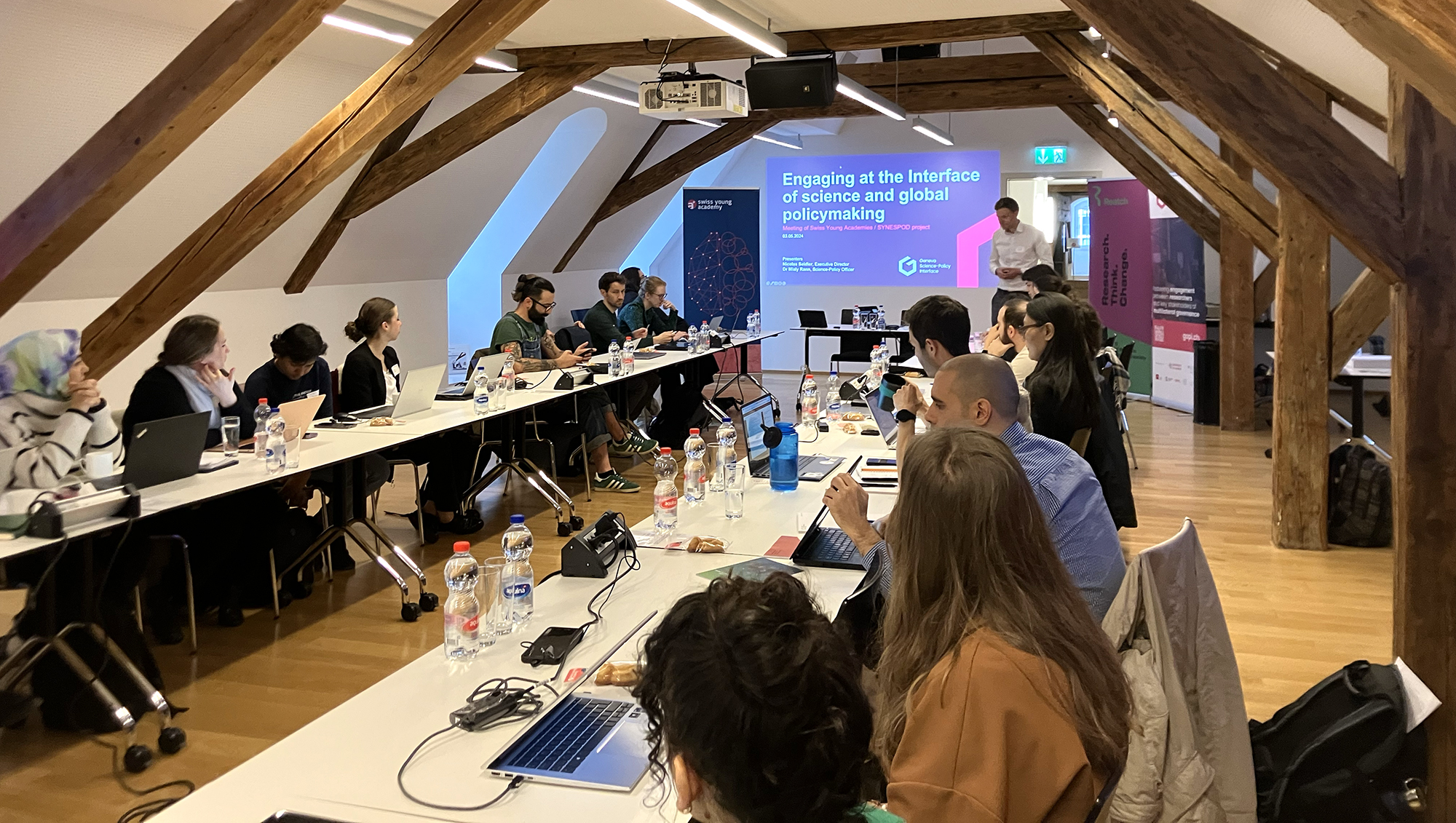Supporting Young Academies at the interface of science and multilateral policy

Written by Dr Mialy Rann & Nicolas Seidler
Young Academies (YAs) are academic organisations, often linked to National Academies of Science, that gather young scientists and scholars from all disciplines, often at the start of their independent careers. Around 50 national young academies exist in various countries, as well as a Global Young Academy that supports existing national YAs or their creation. YAs aim to give a voice to young scientists on policies related to science, but also to facilitate dialogues between science, society and political action.
As part of their goals to build awareness and competencies for early-career researchers to engage with international policy organisations, we were recently invited to develop and facilitate tailored workshops for two Young Academies: the Young Academy of Sweden and the Swiss Young Academy. The workshop with the latter was part of the project Swiss Young Network for Science Policy and Diplomacy (SYNESPOD), and co-organised with Reatch, which covered engagement at the national level in Switzerland, while we at the GSPI went over engagement at the multilateral level, with a particular focus on the international Geneva’s UN ecosystem.
The workshops gathered vibrant groups of early and mid-career researchers working on diverse subjects from health to environment, open science or technology. Most participants had some experience in policy engagement or a keen interest in exploring potential avenues to engage with multilateral policy processes.
The aim of the workshops was to unpack the role of academic research in addressing global policy challenges and to explore existing science-policy mechanisms and strategies. Various conceptual models of science-policy interfaces were discussed from traditional evidence ‘push-pull’ models to collaborative and systemic models that provide leadership and incentives to work at the interface. Participants could recognise their existing engagement work in these models but also raised the need for more initiatives and structures that support researchers in doing engagement work. Existing mechanisms at the interface of science and multilateral policy span from global science-policy panels to various advisory and consultative mechanisms within the UN system. Participants were able to discuss their experience in these and share lessons learnt with their peers.

Some common lessons from both workshops included the need to understand existing policy processes and related windows of opportunities or the importance for scientists to have ‘endurance’’ in undertaking policy engagement, which at times can be challenging or/and time-consuming.
One of the key strategies for fruitful science-policy collaborations is to develop and maintain a network with policy actors as well as with academic organisations that promote policy engagement. Young Academies can play a useful role in this regard.
According to the 2019 Guiding Principles of Young Academies, one of the responsibilities of YAs is “active science communication, providing science advice for policy, contributing to sustainable development and supporting social initiatives with scientific evidence”. This highlights the potential for YAs to strengthen their role at the interface of science and policy.
We have learned from these interactions with two young academies that YAs members are active in policy engagement at the national level, providing science advice in various forms. Some are also engaged at the multilateral level, including in global panels or working with UN organisations. Through these contributions, YAs can serve as interfaces with national and international policy, as well as platforms for young researchers to learn from their peers. This is one of the aims of the SYNESPOD project, that promotes the engagement of scientists with policy and diplomacy actors and builds their capacity in this field.
Beyond their offerings in capacity building for young scientists, YAs are also connected with other interface organisations involved in multilateral processes such as the International Science Council or the International Network for Government Science Advice. These connections can also be useful for researchers that want to be part of global initiatives that connect scientific expertise with global policy issues.
It was an exciting experience to exchange with the outstanding researchers of the YAs from Sweden and Switzerland. As their academic careers are beginning, with some having a strong interest in multilateral policy engagement, we look forward to following their journey and helping them connect to the international Geneva ecosystem and opportunities.
Learn more about our Learning at the Boundary programme here.


.png)

